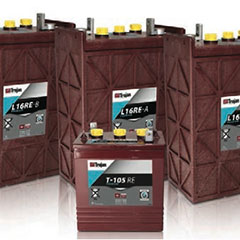Words: Dean Middleton, Senior Sales Director – Renewable Energy, Trojan Battery Co., LLC
Batteries are crucial to the success of PV systems, and yet capitalising on their true efficiency and longevity is often an afterthought. Dean Middleton offers his expert view…
The single most important factor to consider when purchasing a deep-cycle battery for renewable energy (RE) applications is cycle life, which is the number of discharge/charge cycles the battery can provide over its lifetime. Many find that deep-cycle batteries used in RE applications never reach their expected cycle life, but do not know why. The answer is simple – the occurrence of Partial State of Charge (PSOC) in which the batteries are often never fully recharged on a regular basis.
Deep-cycle batteries used in applications such as off-grid RE, remote telecom and backup power systems are heavily cycled at PSOC, and are often never fully recharged on a regular basis. Operating at PSOC can quickly diminish the overall life of a battery, which results in frequent, costly battery replacements.
To address the issue of PSOC, Trojan Battery’s engineering team has done extensive research on technology and methods to extend the life of our deep-cycle batteries designed for RE, remote telecom and inverter backup applications. Based on more than five years of R&D, the team developed Smart Carbon, a proprietary formula of carbon additives designed to enhance life and performance of Trojan Industrial and Premium batteries when they are operated in PSOC settings.
Trojan Battery is the first manufacturer to introduce a carbon additive in deep-cycle flooded batteries for stationary applications. Trojan chose to focus on the addition of carbon to deep-cycle flooded batteries due to the fact that it is still the most widely used battery technology in these types of applications, with widespread availability worldwide and have a more economical price point.
The adoption of carbon additives to prolong the performance of deep-cycle batteries in PSOC applications will continue to expand, since PSOC is a reality of most off-grid RE, telecom and backup power systems. The operation of batteries at PSOC is caused by a wide range of factors and circumstances. Frequently, solar panels used in these applications are undersized, preventing batteries from achieving a full recharge.
The same is true with intermittent weather conditions or placement of solar panels in shady areas, which affect a solar installation’s ability to collect and store enough energy to fully recharge batteries.
PSOC is also common in inverter backup systems when batteries are not fully charged because the grid frequently goes down. Since the grid is the main charging source for the batteries, the consistent unavailability of the grid prevents deep-cycle batteries from being fully recharged on a regular basis, resulting in diminished life of the battery.
In addition, telecom applications which operate off-grid or depend on a hybrid RE/battery system for power face similar PSOC issues as does solar. The same is true for telecom applications that are powered by diesel generators, which also serve as the main charging sources for a telecom solution’s battery backup system. In many diesel generator installations, the system is often set up to purposely not bring the deep-cycle batteries to a full state of charge on a daily basis in order to save money on fuel costs – once again resulting in batteries operating in PSOC conditions.
With batteries being one of the most expensive components of these systems, it is critical to maximize the life of the battery bank in order to reduce total cost of ownership, and lessen the impact that PSOC has on batteries. This was the primary focus of Trojan’s R&D efforts in developing Smart Carbon.
With the continued use of deep-cycle, lead acid batteries in RE applications, increased research has concentrated on the inclusion of carbon. Working at Trojan’s state-of-the art research and development facilities, our engineering team extensively researched various carbon formulations to develop the right additive that would effectively enhance the life and performance of our flooded batteries for renewable energy applications.
The development of the proprietary Trojan Smart Carbon formula provides our Industrial and Premium deep-cycle battery lines improved performance when they are operated in PSOC. SmartCarbon helps enhance overall battery life in an application where the batteries are not fully recharged on a regular basis.
Trojan’s carbon strategy
While most carbon additive research has focused on VRLA batteries for start-stop auto applications, Trojan’s focus has been on carbon formulas for deep-cycle flooded batteries used in stationary applications. For these reasons, Trojan chose to introduce its proprietary carbon additive to its current deep-cycle flooded technology.
The industry’s leading market and technology research firms have also conducted independent research on the use of carbon in lead acid batteries. They have found that the use of carbon on a battery’s negative plates dramatically reduces sulfation at PSOC, which is the leading cause of shortened cycle life of lead acid batteries.
According to the Advanced Lead Acid Battery Consortium (ALABC), an international research cooperative dedicated to the enhanced performance of lead-acid batteries: “Lead carbon batteries provide better performance in partial state-of-charge operations, making them optimal for applications requiring high-rate and recharge.”
The Battery Council International (BCI), a trade association representing leading battery manufacturing companies, has also released similar findings, stating that: “Newly developed carbon-based advanced lead-acid technology has the ability to provide high-energy efficiency and absorb charge rapidly, making it ideal for applications that operate at a partial state of charge.” Moreover, BCI maintains that advanced lead acid batteries will support these applications at one-third of the cost of nickel cadmium and one-quarter of the cost of lithium ion batteries.
Battery manufacturer engineering teams have been aware of the positive impact of carbon on the overall performance of deep-cycle batteries for some time. Trojan’s engineering team has had one goal in mind – to find the right carbon mix to properly address the effects of PSOC on deep-cycle batteries when they are not fully recharged on a regular basis.
With the successful implementation of Smart Carbon in Trojan’s Industrial and Premium lines, it’s important to note that not all carbon additives are alike or provide the same level of performance improvement. The key, as with most any successful solar project, is to research the options available on the market today to carefully select batteries that not only offer enhanced performance but, more specifically, an improved charge acceptance and faster recharge in PSOC applications.
About the author
With over 20 years’ experience in global sales and export of photovoltaic and solar thermal systems, Dean Middleton is responsible for managing Trojan’s key sales initiatives for renewable energy worldwide. Middleton applies his extensive knowledge and skills, in the design, supply and installation of photovoltaic systems.
Smart Carbon(tm) is a Registered Trademark





























